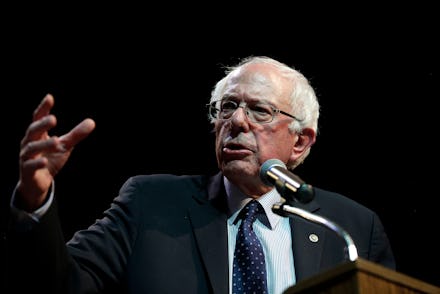Bernie Sanders Just Forced Donald Trump to Make a Major Clarification

Are American workers' wages too high or too low?
For Republican presidential frontrunner Donald Trump, the answer varies.
The real estate tycoon sparked controversy last month when he suggested in a GOP presidential debate that wages were "too high" for the United States to be competitive globally. Pressed to clarify, Trump told MSNBC, "We have to become competitive with the world. Our taxes are too high, our wages are too high, everything is too high."
Those remarks provided fodder for Trump's progressive critics, not least presidential hopeful Sen. Bernie Sanders (I-Vt.), who has made alleviating income inequality the centerpiece of his campaign for the Democratic nomination.
Trump feels the Bern: Breaking with traditional political paradigms, the democratic socialist figures he can win over some of the brash billionaire's supporters by appealing to the same anti-establishment sentiment and economic anxieties that Trump has tapped into, minus the immigrant-bashing and Muslim-banning.
Appearing on CBS News' Face the Nation Sunday, Sanders made the case for why Trump's downscale supporters should back him instead.
"[T]his is a guy who does not want to raise the minimum wage. In fact, he has said that he thinks wages in America are too high. But he does want to give hundreds of billions of dollars in tax breaks to the top three-tenths of 1%," Sanders said.
He continued: "So, I think for his working-class and middle-class supporter, I think we can make the case that if we really want to address the issues that people are concerned about — why the middle class is disappearing, massive income and wealth inequality in this country — that we need policies that bring us together, that take on the greed of Wall Street, the greed of corporate America, and create a middle class that works for all of us, rather than an economy that works just for a few."
That line of attack didn't sit well with Trump, who denied his past statements and called Sanders a liar on Twitter:
In a statement Sunday, Sanders said that Trump's outburst was evidence the Republican was "getting nervous that working families are catching on that his policies represent the interests of the billionaire class against almost everyone else."
"That's not an agenda that 'makes America great,'" he continued. "It's just another Republican billionaire wanting to make the very rich richer at the expense of working families."
By Monday morning, Trump walked back his previous statements that wages were too high, albeit without conceding he'd ever argued as much. In fact, Trump tweeted, wages "are too low":
Baited? Though Trump has yet to call for government measures to boost wages — in fact, he's said he wants to keep the $7.25-an-hour minimum wage "pretty much where it is now" — his changing tune underscores the tension between Trump's white working class base and his bid to helm a party whose leadership opposes efforts to increase the federal minimum wage.
A Public Religion Research Institute survey released last month found that 55% of Trump's supporters are white working class voters — defined by PRRI as non-salaried, non-Hispanic white workers with only a high school education or less. By contrast, only 35% of GOP voters backing other candidates were members of the white working class.
Sanders' effort to woo Trump's working class supporters might be a long shot; 80% of Trump backers told PRRI that immigrants burden the country, and 73% are bothered when they meet non-English speakers, highlighting the role that cultural anxieties play in the Trump phenomenon. But voters in red states like Arkansas, Nebraska, South Dakota and Alaska have also recently approved minimum wage increases, showing that many Republican-leaning voters hunger for higher wages.
Perhaps Sanders can't break the Trump coalition — but he's already showing its contradictions.